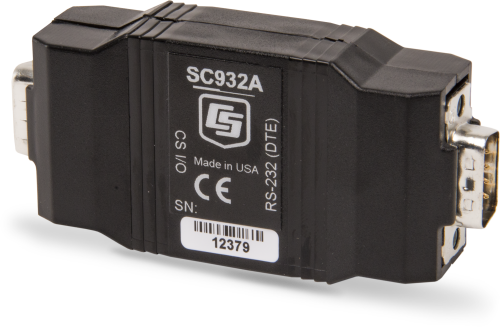
Aperçu
L'interface SC932A permet les communications bidirectionnelles entre une centrale de mesure et un modem ou une interface configuré avec un port série RS-232 DCE. Par exemple le kit CS-SRM (Rad-Modem - modem à courte distance) de Campbell Scientific inclut la SC932A. La SC932A peut également être utilisé avec des modems tiers pour fibres optiques, les modems compatibles Hayes, les émetteurs satellitaires et les radios à étalement de spectre. La SC932A est compatible avec n'importe quelle centrale de mesure équipée d'un port CS I / O.
Lire la suiteAvantages et caractéristiques
- Vitesse de transmission jusqu'à 115.2 kbps
- Fournit de véritables niveaux de signaux RS-232
- Compatible avec la plupart des centrales de mesure de Campbell Scientific
Images

Produits similaires
Description technique
La SC932A est une interface 9 broches. Pour les Modems avec un port série DCE 25 broches, comme le Rad-Modem SRM-5A, pour le connecter au SC932A, il vous faudra l'adaptateur #15751.
Cette interface permet de mettre à niveau la sortie TTL du port CS I/O en RS-232. Il ne supporte pas une sortie unidirectionnelle ou une sortie pour imprimante, notre interface SC105 est recommandé pour ce type d'applications.
Compatibilité
Veuillez noter : Ce qui suit montre des informations de compatibilité générales. Ce n'est pas une liste complète de tous les produits compatibles.
Centrale de mesure
| Produits | Compatibilité | Note |
|---|---|---|
| CR1000 (obsolète) | ||
| CR200X (obsolète) | ||
| CR216X (obsolète) | ||
| CR3000 (obsolète) | ||
| CR5000 (obsolète) | ||
| CR6 | ||
| CR800 (obsolète) | ||
| CR850 (obsolète) | ||
| CR9000X (obsolète) |
Informations de compatibilité supplémentaires
Types de câbles utilisés
Deux câbles (Un câble de données SC12 pour se connecter au port CS I/O et un câble série) sont livrés avec la SC932A. Le câble SC12 connecte la SC932A au port CS I/O de la centrale de mesure et le câble série connecte la SC932A au port RS-232 DCE de l'appareil ou du modem. Un câble SC12R-6 (vendu séparément) peut être utilisé à la place du câble SC12 si un câble plus long est nécessaire.
Spécifications
| Vitesse de communication | jusqu'à 115 200 bps |
| Température de fonctionnement | -25°C à +50°C |
| Fonctionnement en fonction du niveau de l'humidité relative | Jusqu'à 95% (sans condensation) |
| Alimentation requise | alimenté par le 5 V de la centrale de mesure ( jusqu'à 10 mA peuvent être utilisée par un dispositif DCE connecté.) |
| Dimensions | 2,3 x 4,1 x 7,6 cm |
| Poids | 45,4 g |
Documents à télécharger
FAQ
Nombre de FAQ au sujet de(s) SC932A: 11
Développer toutRéduire tout
-
Send the SC932A in to Campbell Scientific for repair. If corrosion is limited to the DB9 connectors, the connectors may just need to be replaced and the interface tested.
To return the SC932A, request a return material authorization (RMA) number and complete a Statement of Product Cleanliness and Decontamination form. The steps are listed on our Repair and Calibration page.
-
No, the SC932A is a CS I/O to RS-232 interface for DCE devices, such as a modem. For Ethernet connectivity, an NL115, NL120, or NL200 should be used; the specific model depends on the datalogger it will be used with and whether data will be stored on a CompactFlash card.
-
The SC932 has jumpers inside to configure how the DTR and RTS lines operate in reference to the datalogger’s modem enable line. There are no jumpers to configure in the SC932A; the DTR line is driven always, and the RTS line follows the datalogger’s modem enable line. If the SC932A does not work with a modem, the issue may be corrected by disabling the hardware flow control and/or configuring the modem to ignore the status of the DTR line.
-
This can be done using a female-to-female null modem adapter or cable.
-
The SC932 is a retired product that has a 9-pin CS I/O connector and a 25-pin male serial DTE connector. It also has jumpers inside to configure how the DTR and RTS lines operate in reference to the datalogger’s modem enable line.
The SC932A has a 9-pin CS I/O connector and a 9-pin male serial DTE connector. There are no jumpers to configure in the SC932A. The DTR line is driven always, and the RTS line follows the datalogger’s modem enable line.
-
If connecting to the CS I/O port, one of the following is needed:
- An SC932A interface with a 15751 9 to 25 pin adapter
- An SC932C interface
A connection can also be made to the RS-232 port. However, the switch on the SRM-5A must be in the DTE position on the station modem, and adapters and gender changers may be needed to complete the connection.
-
If the RF modem has a CS I/O connector, then it should be compatible with the CR10X without the use of an SC932A. Ensure that the RF modem’s firmware is compatible with the CR10X firmware.
Note: RF modems that are not sold by Campbell Scientific will only interface with a CR10X via an SC932A or an SC105.
-
The SC932A only is compatible with modem-enabled (ME) two-way communication between a datalogger and a modem. In contrast, the SC105 is compatible with both ME and Synchronous Device for Communication (SDC) communications, as well as having the ability to internally buffer data.
-
An RS-232 device cannot be directly connected to the CS I/O port of the datalogger. A peripheral, such as an SC932A or SC105, is required.
-
The SC932A ships with two cables: a 2 ft CS I/O cable (SC12) and a 6 ft 9-pin female to 9-pin male serial cable (10873).
